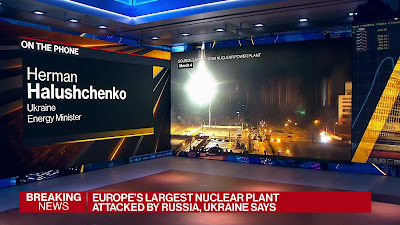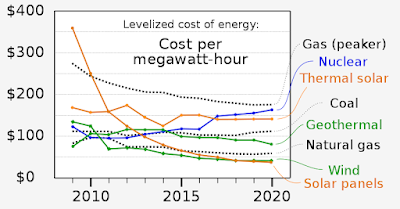Way back when I was shorter, I thought nuclear power was the future. Then I learned more and I realized it had serious problems and I jumped on the anti-nuke bandwagon.
But then I learned more about nuclear energy and radiation and pollution and ecology and, believe it or not, became hesitantly pro-nuke.
That however was many years ago, and since then I've not only learned more about nuclear energy and radiation and pollution and ecology, but I've also learned a lot about human behavior, economics, business, and politics. There have also been two big nuclear accidents in that time.
Now when I hear someone say "We need nuclear power to take up the slack while we transition to renewables to stop global warming," ... and I don't know about you but I've heard this a lot over the past few years ... I'm liable to stare at them and wonder about what they've been smoking.
If I feel like making the effort, my answer to them would be along the lines of, "No. We really don't."
The Problem
Odds are I don't have any information off the top of my head and can't google and read fast enough to counter the gallop that would follow, most of which seems to be the "everyone knows" kind of stuff that sounds suspiciously like it was written by the National Atomic Boosters or some such group.
So ... this post is for future me to point them to.
Two of the biggest and most common arguments for why we need nuclear power are:
1. We don't have enough space for all the solar panels and wind generators.
2. We need extra, reliable power for when the wind doesn't blow and the sun doesn't shine.
The short answers for these are:
1. Bunk.
2. Bunk.
Of course that won't go over very well as it's uninformative and not very friendly.
1. How much do we need?
That's a tough question, and I'm sure if you ask a dozen politicians you'll get five hundred answers.
A quick search got me a number for 400GWh for the annual power consumption in the US. That's a lot.
It got me thinking about where would be a good place to put solar panels that wouldn't be adding to negative environmental impacts (a lot of pro-nuke people bring this up like it's some kind of "gotcha" and like somehow nuclear energy has no effect on the environment).
You know what we have a heck of a lot of here in the US? Roads. Specifically, the Interstate Highway system.
So, look up some numbers, do some math. Not trying to solve problems, mind you. I just want to make sure I'm thinking on the right scale.
We've got 46,876 miles of Interstate Highway (an oddly specific number, eh?). A 3' x 6' solar panel on average puts out around 250W. That means if we put a row of solar panels in the median, in both directions, [ math math math probably got some stuff wrong math ] it comes up to around 40GWh. Yes, that's about 10% of what we need, but it includes using zero new land and would be pretty easy to tie into the existing grid because all roads lead to the grid. That's a new saying I just made up. Feel free to use it.
What that really means is the scale is right. We might not want to actually do it but we've got a lot of other options as well so I'm very sure 100% renewable is both possible and feasible.
Is there anyone else out there that says it's possible and backs it up with better numbers? Turns out, yes. An article was published in Nature last year saying 100% could be met using just rooftop solar alone. Do I understand all the math in it? Hell no. Did I look for articles to the contrary? No, but to be fair I really didn't look hard for this article either.
2. How much do we need?
Well first, we don't have to limit ourselves to X units of production. Here's a really neat chart I found. It shows that for the cost of nuclear power we can build a heck of a lot more renewables.
Disagree with me? Cool. Show me the consensus of experts in the field and I will change my position.
Want to just call me a poopyhead? Fine. Do it somewhere else though. I don't have time for that.





